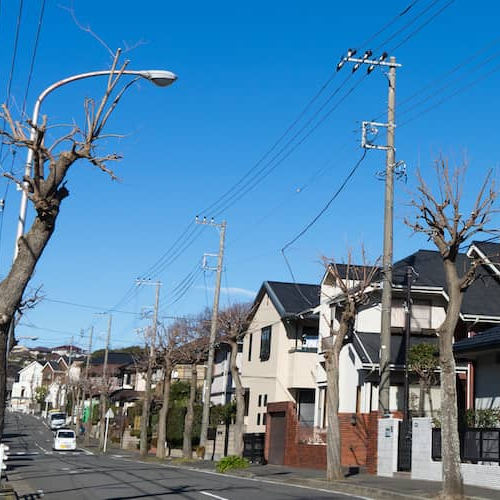Utility easements, explained
Contributed by Sarah Henseler, Tom McLean
Jun 20, 2025
•3-minute read

Generally, an easement on a property deed grants another party legal access to your property. Utility easements often give a utility company the right to access specific parts of your property. For example, the utility company might have an easement to access an electrical pole positioned on your property.
Easements are relatively common, so understanding the rules of a utility easement can help you navigate future property purchases or current property concerns.
What is a utility easement?
A utility easement gives utility companies the right to access a specific piece of private property for the good of the community.
Utility easements can be inconvenient for homeowners. After all, it means someone else has the right to access your property without permission. But without these easements, homeowners might miss out on access to critical services like water, electricity, and sewage treatment.
What is an example of a utility easement?
Let’s say you have trees on your property. If they grow too close to the power lines, the utility company might trim the branches to gain access to the power lines or simply keep the power line clear.
You likely won’t have a say on when or if your tree is trimmed. But keeping the power lines free of overhanging branches helps the utility company keep your neighborhood powered in every condition.
What restrictions affect my property if it has a utility easement?
The details of a utility easement rights can vary from property to property. But understanding the common restrictions attached to utility easements can give you a better idea of your legal rights:
- You must follow clearance requirements: In many cases, utility easements include rules on how much space must be left open around utility lines or equipment. For example, you might need to keep trees trimmed near any power lines.
- You can’t block access for utility companies: Utility companies may need to maintain, repair, or upgrade equipment. As a homeowner, you can’t stop a utility company from accessing the easement.
- You can’t build on top of an easement: Although it’s your property, you don’t have the right to build on an easement. This might mean skipping plans to put in a pool, install a fence, or build an accessory dwelling unit (ADU).
Utility easements are designed to allow the company to serve the community’s needs by providing public utilities, like electricity and water. As long as you have no intentions to interfere with a company’s ability to meet that goal, a utility easement shouldn’t infringe on your enjoyment of homeownership.
How will I know if a utility easement affects my property?
Utility easements are linked to the property’s deed and usually don’t expire. Start by looking at your property deed. In some cases, you’ll find details about any relevant utility easements there. Another option is to review your title report, which you likely received during the home purchase process.
If you run into any issues or have more questions about utility easements on your property, get in touch with your local county recorder’s office.
Can I landscape on top of a utility easement if it’s on my property?
You can often landscape on top of a utility easement to some degree. However, you can’t install landscaping that would interfere with the utility company’s access to the easement.
For example, maintaining grass or wildflowers in a utility easement might be acceptable. But larger landscaping, like extensive flower beds, tall trees, or even robust bushes, that blocks access to the easement won’t work.
If you have specific landscaping plans that you aren’t sure about, consider getting in touch with the relevant utility company to discuss what’s acceptable or not acceptable.
Can you receive compensation for a utility easement?
Property owners often receive some level of compensation for a utility easement up front. But after the utility easement is established, it’s unlikely for the current or future homeowner to receive ongoing compensation.
If a utility company approaches you about a potential easement, consider discussing the details with a lawyer. A competent professional can help you navigate this somewhat complex situation and any necessary negotiations.
What happens if I violate utility easement restrictions?
If you violate any utility easement restrictions, the consequences vary based on the situation. But, generally, the utility company may take the following actions:
- Demolish violating structures: If you erect a structure on the utility easement, the utility company may have the right to tear it down.
- Financial penalties: In some cases, the utility company may fine you for the infraction.
- Legal action: Depending on the situation, the utility company might sue you to regain access to the easement.
The bottom line: Understand utility easements before you buy
Whether you’re considering a real estate purchase or you’re curious about easements on your current property, reading the fine print can help you move forward confidently. Although an easement won’t mean that the property belongs to the utility company, it can place some restrictions on how you can use the property.
Although utility easements are some of the most common, several other types of easements exist. Read more about easements to learn about private easements, easements by necessity, prescriptive easements, and more.
If you’re ready to move forward with a home purchase, start an application with Rocket Mortgage® today.

Sarah Sharkey
Sarah Sharkey is a personal finance writer who enjoys helping readers make informed financial decisions. She lives in Florida with her husband and dogs. When she's not writing, she's outside exploring the coast.
Related resources
6-minute read
Encroachment: Definition and what it means in real estate
An encroachment occurs when part of one person’s property overlaps with another’s. See how an encroachment on your property can lead to problems ...
Read more

5-minute read
Easement appurtenant: What it means and how it works
An easement appurtenant gives nonowners limited access rights to a property. Find out how this type of easement might affect your property.
Read more

4-minute read
Easement in gross: Defined and explained
An easement in gross gives a person the right to use a parcel of land owned by someone else. Read more about easements in gross and how they work.
Read more